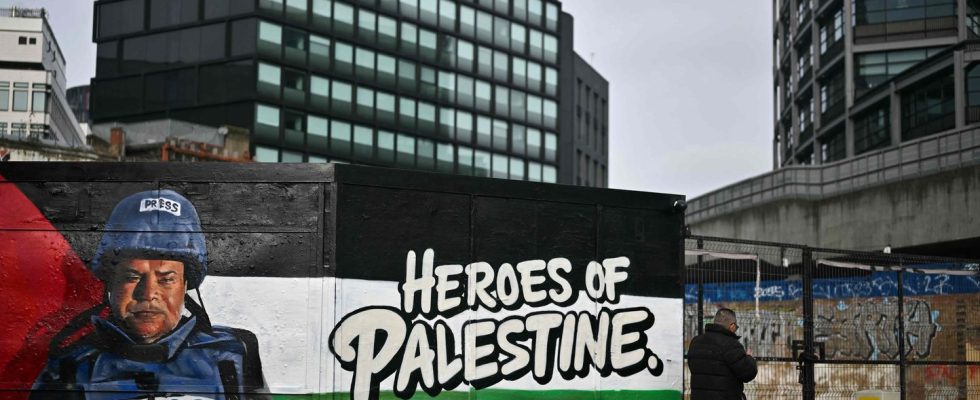Al Jazeera will have to shut up in Israel. Accused of being a “propaganda organ of Hamas”, the Qatari channel is in the process of being banned on Israeli territory after the vote in Parliament – the Knesset – for a law which specifically targeted it. This election, followed by the declaration of Prime Minister Benjamin Netanyahu, who promised to “act immediately”, embarrassed even the United States, a historic ally of Tel Aviv.
Washington, like the Committee to Protect Journalists (CPJ), said they were “concerned” by this ban. The NGO Reporters Without Borders has for its part assured that this “censorship” of “one of the last international media able to inform from Gaza since October 7 [était] unacceptable”.
Blockage in the Middle East and false testimony
“This is not the first time that Al Jazeera has been banned from a country,” recalls Elizabeth Sheppard Sellam. The channel is in fact blocked in Saudi Arabia, Egypt and Bahrain. For the director of the international and political relations program at the University of Tours and a specialist in Israeli politics, “we can therefore see this decision as the banning of RT or Sputnik in France”, in the context of the war in Ukraine and Russian propaganda.
David Rigoulet-Roze, researcher at the French Institute of Strategic Analysis, thinks that a “turning point may have occurred” last week. “ Al Jazeera posted a woman’s supposed testimony online which claimed that Israeli soldiers raped women in al-Shifa hospital. The testimony was obviously false, which the channel ended up recognizing, but the event raises “questions of ethics,” explains the editor-in-chief of the magazine Strategic Orients. The channel, which takes a pro-Palestinian position, then removed the video.
An “additional sign”
“The Arabic-language version of Al Jazeera clearly advocates terrorism,” judges Elizabeth Sheppard Sellam. ” When [le gouvernement israélien] describes certain journalists as “terrorist agents”, it is obviously a prosecution, tempers David Rigoulet-Roze. De facto, the planned ban on Al Jazeera raises the question of press freedom. » However, it is difficult to imagine a domino effect. “This is a further sign of a general situation which is deteriorating in Israel, but the country has a democratic culture of the press; it is unlikely that Israeli media will be targeted,” notes the researcher.
He assures in passing that the articles which come out in the country are “often very severe [envers le gouvernement], sometimes even more than some abroad. Some national newspapers had also crushed Benjamin Netanyahu last year, at the time of his judicial reform, which aimed to limit the capacity of the Supreme Court to invalidate a government decision. A first blow to Israeli democracy which weakened the Prime Minister’s coalition, accused of authoritarian drift by hundreds of thousands of demonstrators.
Netanyahu ‘clings to power’
After almost six months of war in Gaza, demonstrations have increased again in the country in recent days. Tuesday evening, thousands of Israelis gathered again in Jerusalem to demand the resignation of the Prime Minister. He is accused of having “betrayed” the trust of the people by being responsible for the security breach which allowed the unprecedented attack of October 7 and the failure to return the 130 people still hostages of Hamas.
Furthermore, “many Israelis accuse Benjamin Netanyahu of continuing the war in the hope of remaining in power, even though polls clearly show that he would not win if elections were held tomorrow,” explains Elizabeth Sheppard Sellam . “Israeli society remains in turmoil and, in a way, he is taking advantage of this to stay in power,” adds David Rigoulet-Roze.
“Politically, he is certainly condemned,” adds the researcher. He clings to power and seals his destiny with that of the country, which is dangerous given his extremism. » “He makes decisions that could be considered authoritarian or, at a minimum, far-right, to stay in power,” notes Elizabeth Sheppard Sellam.
To the point where, at the beginning of March, Joe Biden disowned Benjamin Netanyahu, believing that he “did more harm than good to Israel”. Worse still, last Monday, the United States abstained from a UN resolution demanding an immediate “ceasefire” in the Gaza Strip. This absence, the first of Tel Aviv’s ally since the start of the conflict, allowed the adoption of this resolution, provoking the ire of the Israeli government, which refuses a new truce. But “it can’t last forever, warns Elizabeth Sheppard Sellam. In a country at war and divided, the regime is likely to collapse, well before any election.”

